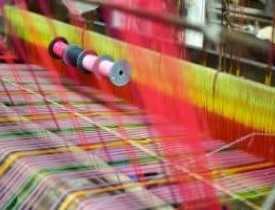Description
Course Name: Certificate in Textile & Apparel Industry
Course Id: CTAIQ1001.
Eligibility: 10th Grade(High School) or Equivalent.
Duration: One Month.
Objective: The objective of this course is to provide learners with essential knowledge and practical skills in textile manufacturing, garment production, and fashion industry operations. The course covers fiber and fabric processing, apparel design, quality control, supply chain management, and entrepreneurship, enabling participants to pursue careers or start businesses in the textile and apparel sector.






Debit/Credit Card, Wallet, Paytm, Net Banking, UPI, or Google Pay.



• A soft copy (scanned) of your certificate via email within 7 days of examination.
• A hard copy (original with official seal and signature) sent to your address within 45 day of declaration of result.

Online Examination Detail:
Duration- 60 minutes.
No. of Questions- 30. (Multiple Choice Questions).
Maximum Marks- 100, Passing Marks- 40%.
There is no negative marking in this module.
| Marking System: | ||||||
| S.No. | No. of Questions | Marks Each Question | Total Marks | |||
| 1 | 10 | 5 | 50 | |||
| 2 | 5 | 4 | 20 | |||
| 3 | 5 | 3 | 15 | |||
| 4 | 5 | 2 | 10 | |||
| 5 | 5 | 1 | 5 | |||
| 30 | 100 | |||||
| How Students will be Graded: | ||||||
| S.No. | Marks | Grade | ||||
| 1 | 91-100 | O (Outstanding) | ||||
| 2 | 81-90 | A+ (Excellent) | ||||
| 3 | 71-80 | A (Very Good) | ||||
| 4 | 61-70 | B (Good) | ||||
| 5 | 51-60 | C (Average) | ||||
| 6 | 40-50 | P (Pass) | ||||
| 7 | 0-40 | F (Fail) | ||||







Syllabus
Introduction to Textile and Apparel Industry: Overview of textile and apparel sector, History and evolution of textiles, Classification of textile fibers, Introduction to natural and synthetic fibers, Global and Indian textile industry scenario, Importance of the apparel industry in economy, Key stakeholders in the textile value chain, Emerging trends and innovations, Career opportunities in the textile sector, Overview of textile policies and schemes.
Fiber to Yarn Processing: Types of textile fibers and their properties, Fiber identification methods, Ginning and opening processes, Carding and combing techniques, Drawing and roving processes, Spinning methods (ring, open-end, air-jet), Yarn types and classifications, Yarn twist, count and strength, Yarn defects and their causes, Yarn packaging and storage.
Fabric Manufacturing Technologies: Weaving fundamentals and loom types, Basic weaves (plain, twill, satin), Knitting (warp and weft knitting techniques), Nonwoven fabric production, Fabric structure and properties, Jacquard and dobby designs, Fabric defects and inspection, Productivity in fabric production, Modern fabric technologies, Finishing of grey fabrics.
Textile Wet Processing: Pre-treatment processes (scouring, bleaching), Dyeing techniques (vat, reactive, disperse dyes), Printing methods (screen, digital, block), Finishing processes (softening, calendaring, mercerization), Eco-friendly processing methods, Water and chemical management, Color fastness testing, Effluent treatment in wet processing, Quality control in dyeing and printing, Use of automation in wet processing.
Apparel Manufacturing Techniques: Apparel product categories and specifications, Garment design and pattern making, Cutting room operations and layout, Sewing machines and operations, Assembly line balancing, Finishing and packaging processes, Stitching defects and solutions, Work-study and motion economy, Garment cost components, Role of CAD/CAM in apparel production.
Quality Assurance and Testing: Standards in textile and apparel industry, Fabric and garment testing methods, Dimensional stability and color fastness tests, Seam strength and abrasion resistance, Inspection systems (4-point, AQL), Defect classification and documentation, Quality control tools and charts, Garment fit and measurement checks, ISO and other certifications, Lab equipment and calibration.
After successful completion of the Certificate in Textile & Apparel Industry program, graduates are equipped with essential skills in fabric processing, garment production, quality control, fashion basics, merchandising, and industrial operations. The Indian textile and apparel sector is one of the largest globally and a major employment generator, providing excellent job and entrepreneurship opportunities.
✅ Career Options After Certificate in Textile & Apparel Industry – India
| Job Role | Job Description | Average Salary Range (per annum) |
|---|---|---|
| Production Assistant | Supports textile or garment manufacturing processes, ensures smooth flow of materials and operations. | ₹1.8 – ₹3.5 Lakh |
| Quality Control Inspector | Checks fabric quality, stitching, finishing, and packaging in textile units or apparel factories. | ₹2.0 – ₹4.0 Lakh |
| Apparel Merchandiser | Coordinates between buyers and production teams; manages samples, costing, and deliveries. | ₹3.0 – ₹6.0 Lakh |
| Textile Technician | Operates and maintains machines used in spinning, weaving, dyeing, and finishing. | ₹2.5 – ₹5.0 Lakh |
| Fashion Designer Assistant | Assists designers with sampling, material selection, and basic pattern creation. | ₹2.0 – ₹4.5 Lakh |
| Fabric Sourcing Executive | Manages purchase and procurement of fabrics, trims, and accessories for production. | ₹2.5 – ₹5.5 Lakh |
| Garment Production Supervisor | Oversees stitching, cutting, and finishing lines to ensure timely output and quality. | ₹3.0 – ₹6.0 Lakh |
| Entrepreneur – Boutique / Apparel Unit Owner | Starts own fashion boutique, tailoring shop, or small garment production unit. | ₹5 – ₹20+ Lakh (profit-based) |
🧵 Industries & Sectors Employing Graduates
-
Garment and apparel export houses
-
Textile mills (spinning, weaving, dyeing units)
-
Fashion houses and boutiques
-
E-commerce apparel brands
-
Government schemes under MSME, KVIC, or Textile Ministry
-
Sustainable fashion and organic clothing companies
💼 Entrepreneurial Opportunities
Graduates can start:
-
Tailoring and alteration services
-
Customized apparel boutiques
-
Small-scale garment manufacturing (T-shirts, uniforms, babywear, etc.)
-
Embroidery and handwork business
-
Online clothing brand (via Amazon, Meesho, Shopify)
💰 Earnings Potential:
-
Boutique/tailoring shop: ₹30,000 – ₹1 Lakh/month
-
Small garment unit: ₹10 – ₹25+ Lakh per annum
-
Online apparel sales: Depends on branding & volume (₹5 Lakh/year and above possible)

